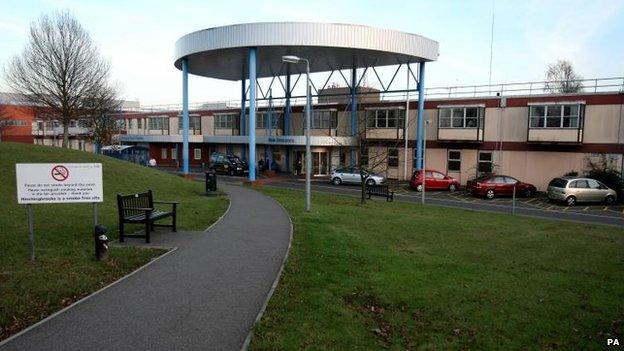Can a private business run a hospital?
- Published
- comments

This morning the first - and only - private business to run an acute services hospital has announced it is pulling out.
It is difficult to imagine a more significant moment in the whole debate about the provision of health care in Britain.
A spokesman for Circle - the company running Hinchingbrooke - told me that it was difficult to see how any private operation looking for a commercial return could run an acute services hospital under the present model.
For those who object to private companies operating in the NHS, a response to the announcement this morning might well be "good riddance".
It is worth, though, considering why the previous Labour government decided to offer the contract to run Hinchingbrooke to private operators.
There is an argument that private companies bring a discipline to health service provision which can lead to better patient services, and staff relations, for lower costs.
Any returns the company makes can then be shared with the NHS. In Circle's case, if it had made profits above £2m, anything above that would be split with the public sector.
High risk
The NHS has, of course, always been a mixture of public, private and voluntary provision. GPs are not state employees, for example, but independent contractors to the NHS.
That mix is one many believe works when it comes to relatively predictable services such as elective operations.
But Hinchingbrooke is different and became a test for the public/private model at the most visible level - the running of an entire hospital.
It was certainly high risk.
Before Circle took over the contract, Hinchingbrooke was a struggling hospital. It was labouring under £40m of debts and in 2009 the then Labour government decided to launch a process to bring in private providers.
Circle, which is partly owned by its employees, won that bidding process. The fact it took three years (Circle did not take over Hinchingbrooke until 2012) reveals just how complicated the agreement was.
And the more complicated a contract, the greater the risks attached.
Demand spike
Circle pledged to increase levels of care offered to local people, turn around the hospital's finances and create better staff relations.
To an extent, and certainly at the beginning of the contract, there was some success. Waiting time targets were hit, patient feedback improved and efficiencies were made.
The hospital's deficit fell from £10m in February 2012 to £3.5m in March 2013 to £1.5m in March last year.
And Circle claims it saved the NHS £23m.
But healthcare does not operate by the usual laws of supply and demand.
Demand, as we have seen recently in accident and emergency services, can suddenly spike.
And that can happen at the same time as supply - payments for each patient treated - falls.
Circle said its payments had been cut by 10%.
The result? Losses for Circle which have now reached £5m, the trigger point at which it can say it no longer wants to run the hospital.
The business is also expected to be criticised by an imminent Care Quality Commission (CQC) report on its standards of health care.
Circle may dispute the findings, but the CQC report would almost certainly have led to increased costs as new service levels were agreed.
Today's announcement has revealed that under the present model, many believe there is a pretty simple answer to the question can a private business run an acute hospital.
And it's no.